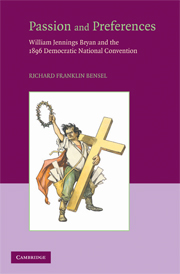7 - Bryan's “Cross of Gold” Speech
Published online by Cambridge University Press: 24 July 2009
Summary
Bryan had been asked to deliver one of the speeches supporting the silver plank approved by the Committee on Resolutions. When his turn to speak came, he had been recognized and introduced by the permanent chairman of the convention. He thus occupied an entirely legitimate position within the ritual order of the convention, and any disruption of his speech was subject to ritual suppression. However, the last thing in the world that Bryan desired was the suppression of the massive demonstrations that preceded, accompanied, and followed his address. To the contrary, he all but openly invited his listeners to create a riotous uproar that was entirely forbidden by the ritual formalities of the moment; if the chairman had wanted to suppress these demonstrations, they would have been subject to the most stern and serious censure an assembly can pronounce. In fact, the “Cross of Gold” speech drew much of its energy from this tension between a ritually authorized speaker and his ritually condemned respondents.
This symbiosis between Bryan and his audience clearly rested on the characteristics of the moment, a moment created by the ritual backbone of the convention. If Bryan had delivered the same text at any other time, the effect would have been far less dramatic. Bryan himself realized that was the case and intentionally maneuvered so as to deliver the last speech during the platform debate. He also wrote and rewrote his address in order to better create the response he wished to elicit from his audience.
- Type
- Chapter
- Information
- Passion and PreferencesWilliam Jennings Bryan and the 1896 Democratic Convention, pp. 203 - 247Publisher: Cambridge University PressPrint publication year: 2008



